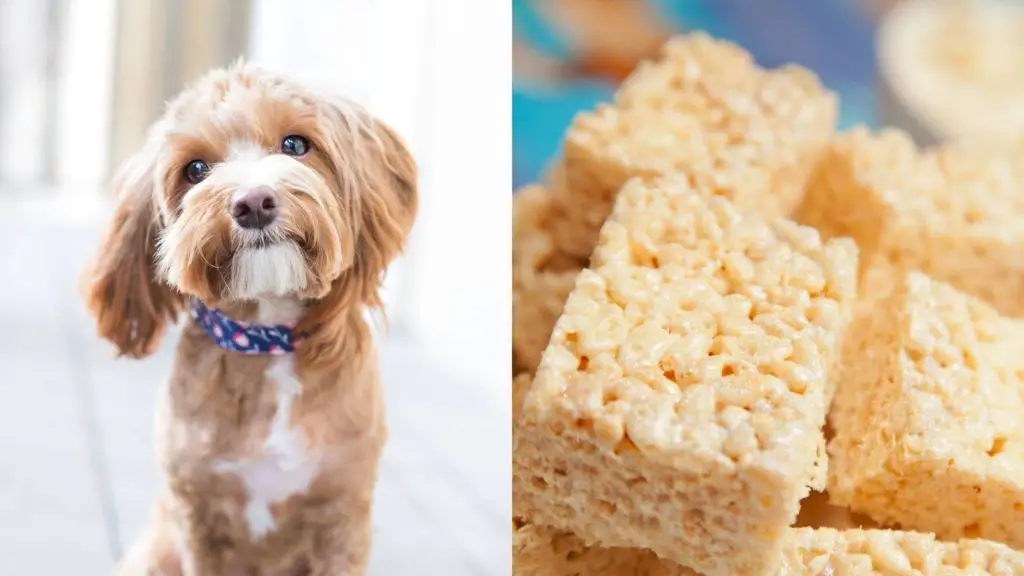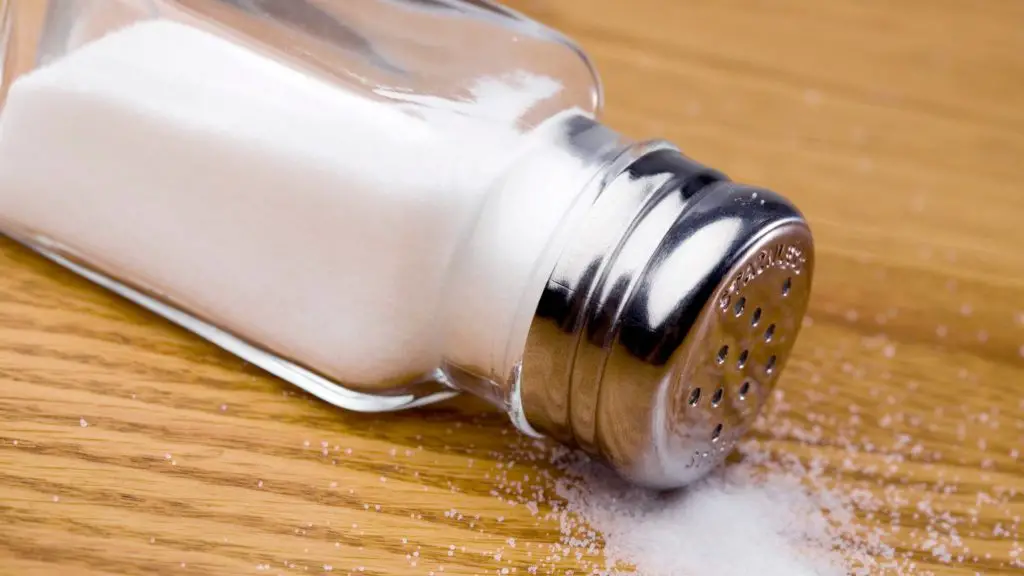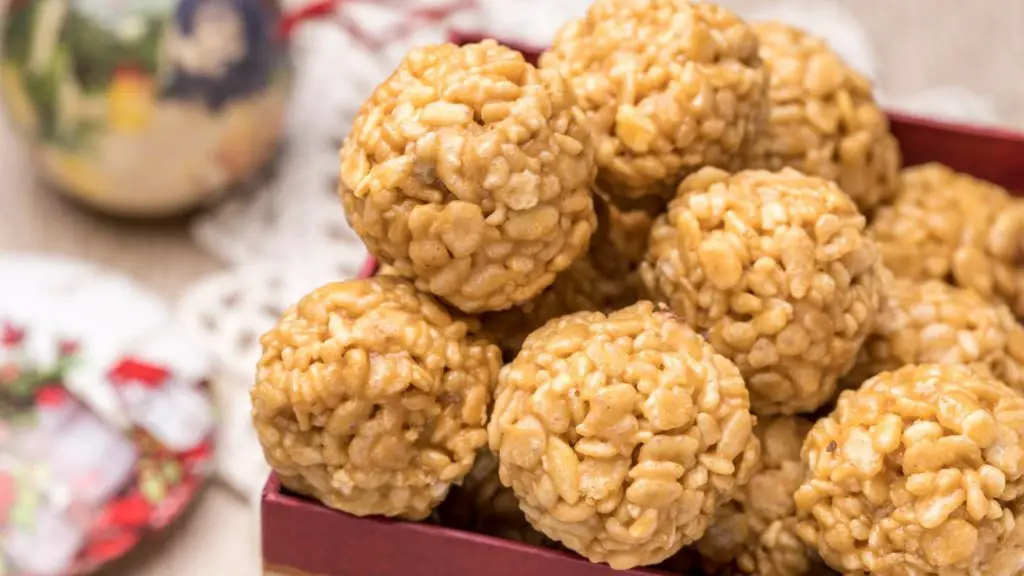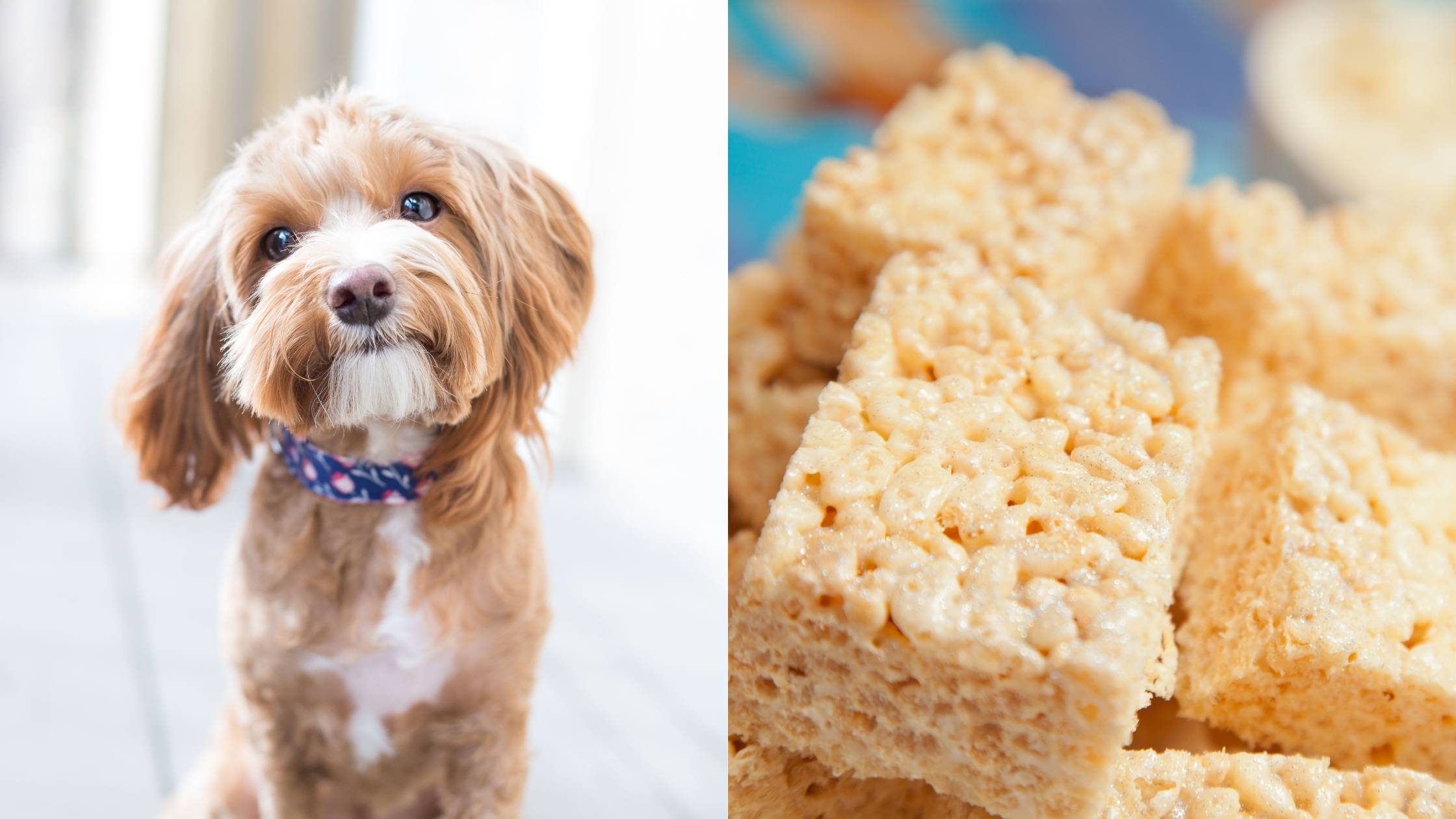Last Updated on 11/17/2021 by Veronica Jones
Rice Krispies and Rice Krispie treats are firm cupboard favorites in many households. There’s something about the snap, crackle and pop that keeps children and adults coming back to this popular breakfast rice cereal.
Sharing dog-safe human foods with your furry friend is one of the joys of owning a dog, but is Rice Krispies one of the ones that won’t cause them harm? Let’s find out.
Can dogs eat Rice Krispie treats?
Yes, Rice Krispies are a rice based cereal that is safe for dogs to eat. Many commercial dog foods use rice as the protein source, so you don’t need to worry about your dog becoming sick from some Rice Krispies.
A Rice Krispie treat, however, contains high levels of sugar, salt and artificial ingredients that make it an unhealthy choice for pets.

What ingredients in Rice Krispie treats are bad for dogs?
Even though Rice Krispies treats contain vitamins, minerals, protein and fiber, they should not be given as a meal replacement to your pup. Dogs require a high protein diet, however the ingredients in Rice Krispie treats can be bad for dogs if eaten in large quantities.
Sugar – large amounts of sugar in a dog’s diet can affect overall health and wellbeing. Cavities, upset stomach, weight gain and diabetes are just some of the health conditions from eating too much sugar.
Salt – this cupboard essential is poisonous to both cats and dogs if eaten in large quantities. If your dog eats too many Rice Krispie treats, there’s a chance he could exceed the recommended daily allowance of salt for dogs and experience symptoms such as:
• Vomiting
• Diarrhea
• Lethargy
• Decreased appetite
• Seizures and tremors
• Excessive thirst or urination
Your dog should be taken to a vet for emergency medical attention if there’s a chance he has ingested too much salt.
Preservatives – lots of treats contain chemicals such as Tetrasodium Pyrophosphate or Butylated Hydroxytoluene to prolong the shelf life of foods. Preservatives have been linked to damaged blood vessels and renal disease in dogs and should not be consumed.
Dogs that are gluten-intolerant should only eat Rice Krispies that are non-malted and gluten-free because malt barley flavoring is often used to enhance the taste and nutritional value. If your dog is intolerant to gluten, eating Rice Krispies could cause him diarrhea, weight loss, fatigue, ear infections and poor overall health.
If your dog is overweight or has diabetes, Rice Krispie treats should be avoided as they will cause your canine’s blood sugar levels to rise significantly.

Additional toxic ingredients
If buying store-bought Rice Krispie treats, always read the ingredients first. Some brands may contain harmful substances such as chocolate and xylitol, which are both toxic to dogs.
Whilst chocolate is a tempting food for humans, it’s highly toxic to dogs because of the stimulant theobromine. Dark chocolate contains the most danger, however all chocolate should be kept out of reach from dogs as it can cause kidney failure in extreme cases.
Xylitol is used as a sweetener in treats instead of sugar. It is extremely toxic to dogs and can cause low blood sugar levels, seizures, liver failure and even death in canines.
Vanilla extract is another popular ingredient that is added to Rice Krispie treats, but many people don’t know that it’s over 30% alcohol. Dogs can’t process well and it can make them extremely sick. Alcohol toxicity is serious and should be treated as an emergency. Whilst it’s unlikely that Rice Krispie treats contain enough vanilla extract and alcohol to cause your dog significant harm, it’s worth being aware of the signs of alcohol toxicity. Depression, lethargy, drooling, retching or vomiting, weakness, collapse, low blood pressure and a decreased respiratory rate are all common signs that your pup has consumed alcohol.
What happens if my dog eats too many Rice Krispie Treats? Are they an adequate meal replacement?
If your pup manages to get into your kitchen cupboards and gobble up far too many Rice Krispie Treats, chances are he will feel sick and a bit sorry for himself. Reactions such as vomiting, diarrhea, restlessness, dehydration, panting and constipation are normal, however you should consult your veterinarian if you’re worried about your dog’s behavior. Marshmallow cream that is found in the leading brands of Rice Krispy Treats usually contain xylitol.
Rice Krispie Treats should not replace dog food. Many dog foods contain rice, which is also used in these sugary treats but does not have added sugar or preservatives.
Homemade Rice Krispie Treats for your pup
Making homemade foods for your pet is the best way to ensure it doesn’t contain any potentially harmful ingredients. Give this simple recipe a go and save the store-bought treats for yourself.
Ingredients:
• Wholewheat flour (1 cup)
• Rice Krispies (2 cups)
• Dog-safe peanut butter (1/4 cup)
• Melted coconut oil (1/2 cup)
• Eggs (2)
Method:
1. Preheat your oven to 350F.
2. Mix the melted coconut oil and peanut butter together in a bowl.
3. Add the eggs, Rice Krispies and flour and mix until combined.
4. Use your hands to mold rectangular shapes with the mixture.
5. Place on a lined baking tray and bake in the oven for about 10 minutes.
Once cooked, allow to cool completely and store in an airtight container for up to one week.

Dogs and Rice Krispies
So, can dogs eat Rice Krispies? Yes, but it’s not recommended as a healthy snack. If your dog hoovers up some leftover rice puffs leftover from breakfast, he won’t come to any harm. But just because a food is safe for most dogs, it doesn’t necessarily mean it’s good for them. Rice Krispies and Rice Krispie Treats should only be given to dogs in small amounts, or not at all.
Looking for More Great Articles About What Your Dog Can (or Can’t) Eat?
- Can Dogs Eat Orange Chicken? Is it Safe?
- Can Dogs Eat Meatballs? Are They Healthy?
- Can Dogs Eat Granola? Facts, Guidance, Recipes and More
- Can Dogs Eat Rose Petals? Are they Toxic?
Reference list
- Battersea “toxic food for dogs” https://www.battersea.org.uk/pet-advice/dog-care-advice/toxic-food-dogs Accessed 23rd October 2021
- VCA Hospitals “xylitol toxicity in dogs” https://vcahospitals.com/know-your-pet/xylitol-toxicity-in-dogs Accessed 23rd October 2021
- Pet Poison Helpline “salt poisoning in dogs” https://www.petpoisonhelpline.com/poison/salt/ Accessed 23rd October 2021
- AKC “alcohol and dogs” https://www.akc.org/expert-advice/vets-corner/is-alcohol-dangerous-for-dogs/ Accessed 23rd October 2021

